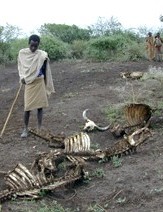|
afrol News, 5 February - This year, at least 11 million Ethiopians will need external food aid due to the worst drought since the 1984-85 disaster, when one million persons starved to death. Demographists now warn that these periodic drought and hunger disasters may become a chronic feature within 20 years. - The Ethiopian population is growing into drought, warns the German foundation World Population (DSW). "Within only two decades, water will become chronically scarce in Ethiopia," the German demographists have calculated. One of the4 main reasons behind this negative outlook is the very high speed of population growth in Ethiopia. "If we don't help countries with water scarcity such as Ethiopia to slow down their immense population growth, the efforts to curb future disasters of starvation will become more and more difficult," says Dr Hans Fleisch from DSW. Ethiopian water reservoirs already have sunk below the limit considered critical, some 1700 cubic metres each person. If the projections of the country's population growth are to fulfil, the access to sweet water will sink to under 1000 cubic metres each Ethiopian within a mere twenty years. - Without sufficient water there is no room for development, or not even survival, according to Mr Fleisch. "It is essential to achieve a slow-down of the population growth through family planning programmes to lessen the dangers of starvation and water conflicts at a larger time scale," he adds. According to the latest statistics, the Ethiopian population has almost doubled during the last twenty-five years, up from 33 million to a present 63 million. The latest UN assessments foresee another population growth of 50 million persons during the next quarter of a century. While the population thus is expected to grow to a total number of 113 millions by 2028, there will even be 186 million Ethiopians by 2050, if one is to believe these projections. The numbers are based on an unchanged fertility rate during the next decades. Presently, the average Ethiopian woman gives birth to six children. While the German research team warns against the dangers of a booming Ethiopian population, other social scientists hold that an increased population in under-populated Africa only can be a welcome resource to develop the continent. This however presupposes increased investments to educate the new and voluminous generations. Surely, they cannot all feed on subsistence agriculture. Sources: Based on DSW and
afrol archives
|
front page
| news
| countries
| archive
| currencies
| news alerts login
| about afrol News
| contact
| advertise
| español
©
afrol News.
Reproducing or buying afrol News' articles.
You can contact us at mail@afrol.com

